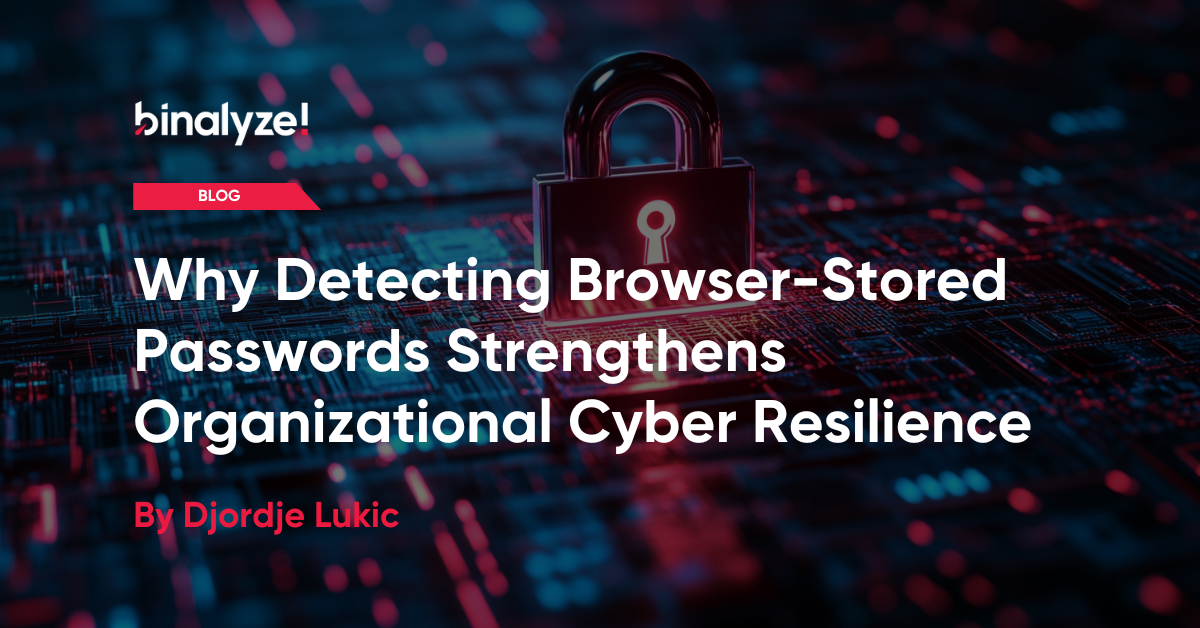2 min read
Why Detecting Browser-Stored Passwords Strengthens Cyber Resilience
![]() Djordje Lukic
:
Thu, Oct 2, '25
Djordje Lukic
:
Thu, Oct 2, '25

The Risk of Browser-Stored Passwords
Modern browsers make it convenient to save credentials, but this convenience comes with a cost. Unlike cloud-based password managers that encrypt and tightly control access to credentials, browsers store passwords locally in SQLite databases or credential vaults.
For attackers — especially those deploying infostealer malware (like RedLine, Raccoon, Vidar) — these are easy pickings. If malware lands on an endpoint, it can programmatically read browser password stores, cookies, and autofill data. In seconds, an attacker can harvest:
-
Credentials to internal systems
-
Session tokens that bypass MFA entirely
-
Sensitive personal and financial data
This means that a single infected device can hand over the keys to an attacker without ever tripping a detection alert.
👉 Key stat: 75% of organizations struggle with root cause identification during incidents, making it harder to see how an infostealer foothold actually enabled an attacker to bypass defenses.
Why Password Managers Are Safer
Password managers like 1Password, Bitwarden, or KeePassXC take a very different approach:
-
Credentials are stored in encrypted vaults (AES-256, Argon2, etc.).
-
Data is only decrypted briefly when needed.
-
Separation from the browser reduces attack surface.
-
Extra safeguards (biometric unlock, zero-knowledge encryption, clipboard clearing) minimize exposure.
Unlike browsers, where the decryption key is stored locally for convenience, password managers force attackers to break strong encryption — a much higher bar.
How the New Detection Works
The new detection capability in Binalyze AIR automatically identifies when users are storing passwords in browsers.
-
Evidence is collected from browser login data (Chrome, Edge, Opera).
-
Drone analyzers review this encrypted logging data and flag when passwords are stored.
-
Findings are displayed in the Investigation Hub, giving security teams clear visibility into risky behavior.
.png?width=1747&height=897&name=Screenshot%202025-10-01%20152938%20(1).png)

This enables organizations to:
-
Spot at-risk endpoints where browser password storage is active.
-
Take proactive steps to enforce safer credential management policies.
-
Support compliance efforts by providing visibility into credential hygiene practices.
Why This Matters for Organizational Security
Stopping infostealers isn’t just about detection. It’s about removing easy opportunities for attackers. By preventing employees from storing passwords in browsers, organizations reduce one of the most exploited data sources.
This aligns with broader cyber resilience goals:
-
Conclusive evidence over circumstantial: quickly see if compromised devices had browser-stored passwords.
-
Compliance confidence: regulations like GDPR, DORA, and NIS2 emphasize strong access control and credential management.
-
Defense in depth: complements EDR/XDR and password managers by ensuring investigative readiness and root cause clarity.
Takeaway
Teams don’t need more alerts — they need timely answers. Browser-stored password detection is another way AIR empowers SOCs to move from reactive firefighting to proactive investigation readiness.
It’s not about replacing analysts — but equipping them with the visibility they need to enforce safer practices, cut off attacker entry points, and strengthen overall cyber resilience.










